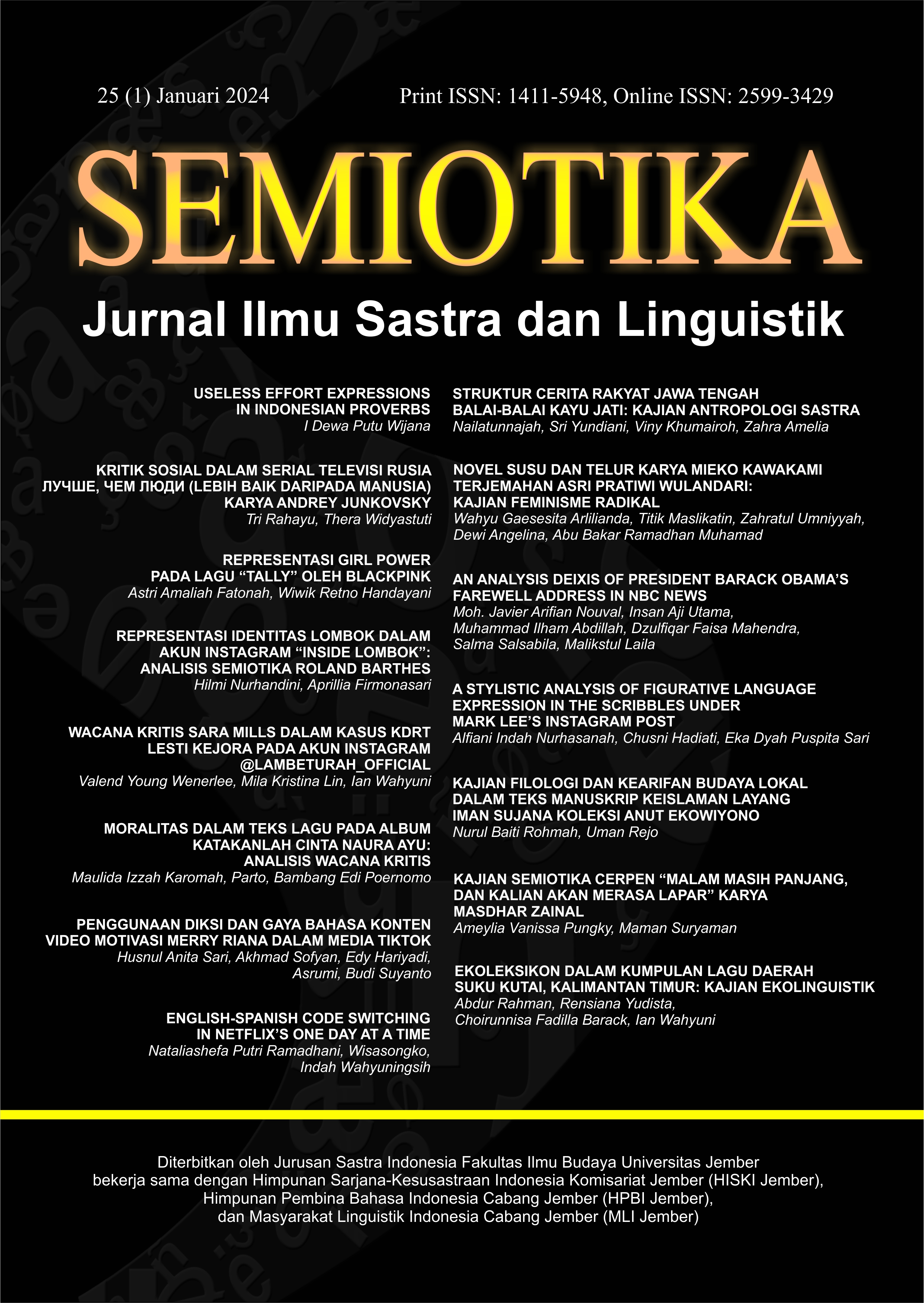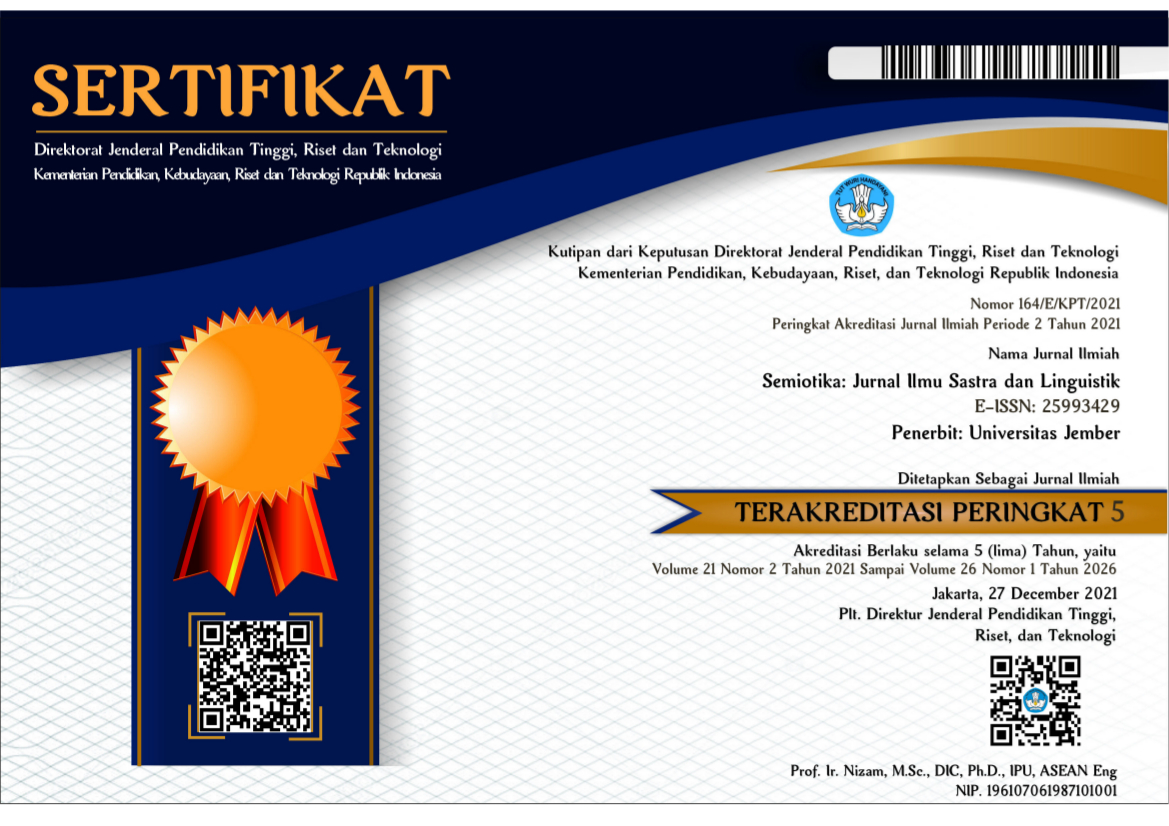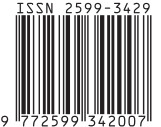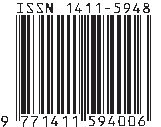KAJIAN FILOLOGI DAN KEARIFAN BUDAYA LOKAL DALAM TEKS MANUSKRIP KEISLAMAN LAYANG IMAN SUJANA KOLEKSI ANUT EKOWIYONO
Abstract
This research describes the Islamic manuscript text Layang Iman Sujana with philological studies and local cultural wisdom. Layang Iman Sujana is a collection of Islamic manuscript texts collected by Anut Ekowiyono which contains the journey of the figure Iman Sujana from the country of Ngesam to spread the religion of Islam. This research aims to determine the study of philology and the study of local cultural wisdom in the Islamic manuscript text Layang Iman Sujana. This research is research using philological methods and is linked to local knowledge theory with the Tri Hita Karana cosmological concept. The results of the research show that Layang Iman Sujana generally tells the story of the character Iman Sujana who spread Islam on the orders of his father, Abdur Asfar. The local cultural wisdom contained in Layang Iman Sujana consists of two categories, namely harmonizing the relationship between people and God and harmonizing the relationship between people and each other. Harmonization of people with God in the form of sahadat, sharia, dhikr, surrender, torekot, prayer, quran, eling, piwales, titah, sukur, nugraha, and compassion. Meanwhile, the harmonization of humans with fellow humans takes the form of urmat, panuwun, ngabekti, tumindak becik, uluk salam, ngajeni, bale homestead, manners, nyenengke others, confident, combing anger, empan plank, and compassion.
References
Ayatrohaedi. 1986. Kepribadian Budaya Bangsa (Local Genius). Jakarta: Pustaka Jaya.
Baried, S.B. 1994. Pengantar Teori Filologi. Yogyakarta: BPPF Fakultas Sastra Universitas Gadjah Mada.
Djamaris, E. 1977. “Filologi dan Cara Kerja Penelitian Filologi” dalam Bahasa dan Sastra, 3 (1):20—30.
Djamaris, E. 2002. Metode Penelitian Filologi. Jakarta: Manasco.
Geertz, C. 1981. Abangan, Santri, Priyayi dalam Masyarakat Jawa. Terjemahan Mahasin, A. Jakarta: Pustaka Jaya.
Geertz, C. 1983. Local Knowledge: Further Essays In Interpretive Anthropology. New York: Basic Books, Inc, Publishers.
Neonbasu, G. 2017. Citra Manusia Berbudaya: Sebuah Monografi Tentang Timor dalam Perspektif Melanesia. Jakarta: Angkasa.
Padet, I W. & Krishna, I.B.W. 2018. “Falsafah Hidup dalam Konsep Kosmologi Tri Hita Karana” dalam Genta Hredaya, 2 (2):37—43.
Rejo, U. 2021. “Sifon, Nain Fatu, dan Humanitas Perempuan dalam Fiksi Kutukan Perempuan Celaka Karya Felix K. Nesi” dalam Wajah Kemanusiaan dalam Perspektif Bahasa, Sastra, dan Pengajaran Bahasa Indonesia. Klaten: Lakeisha.
Rejo, U. 2022. “Sistematika Penulisan Karya Ilmiah” dalam Memahami Bahasa Indonesia di Pendidikan Tinggi. Uman Rejo dan Nurul Baiti Rohmah (Editor). Indramayu: Adab.
Rohmah, N.B. 2023. “Menelisik Naskah-Naskah Keislaman di Lereng Gunung Kawi Malang Jawa Timur”. Kontemplasi: Jurnal Ilmu-ilmu Ushuluddin, 11 (1):81¬¬—107.
Sari, W.A. 2023. “Kebahagiaan dalam Perspektif Kebudayaan Jawa: Kajian terhadap Teks Wulang Utami Tigang Prakawis”. Jumantara: Jurnal Manuskrip Nusantara, 14 (1):87—107.
Sibarani, R. 2012. Kearifan Lokal: Hakikat, Peran, dan Metode Tradisi Lisan. Jakarta: Asosiasi Tradisi Lisan (ATL).
Sudardi, B. 2001. Dasar-Dasar Teori Filologi. Surakarta: Badan Penerbit Sastra Indonesia Fakultas Sastra Universitas Sebelas Maret.
Sutrisno, S. 1981. “Relevansi Studi Filologi”. Pidato Pengukuhan Jabatan Guru Besar Ilmu Filologi pada Fakultas Sastra dan Kebudayaan Universitas Gadjah Mada Yogyakarta.

This work is licensed under a Creative Commons Attribution-ShareAlike 4.0 International License.
SEMIOTIKA has CC-BY-SA or an equivalent license as the optimal license for the publication, distribution, use, and reuse of scholarly work. Authors who publish with this journal retain copyright and grant the journal right of first publication with the work simultaneously licensed under a Creative Commons Attribution-ShareAlike 4.0 International License that allows others to share the work with an acknowledgment of the work's authorship and initial publication in this journal.
Attribution-ShareAlike
CC BY-SA










